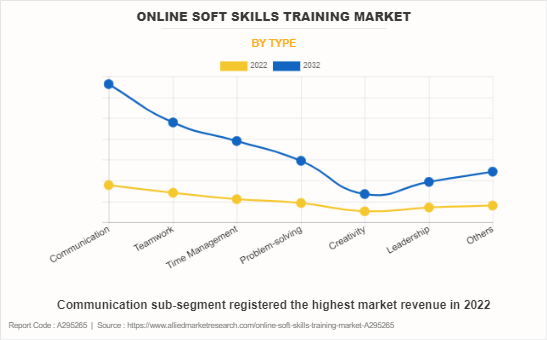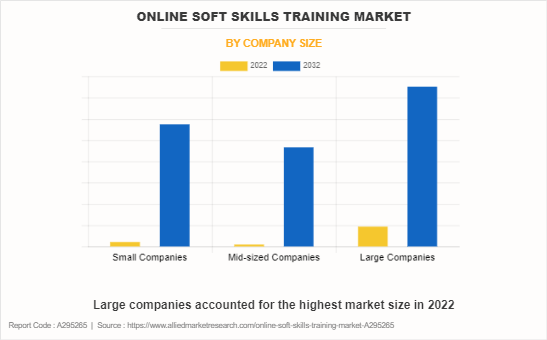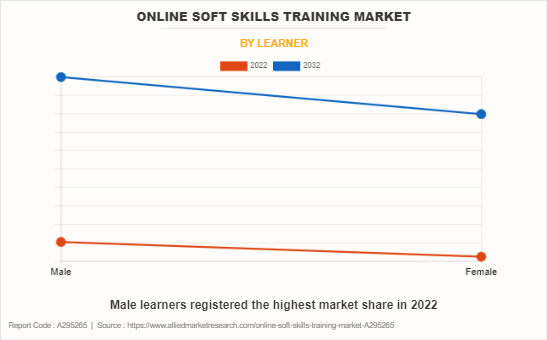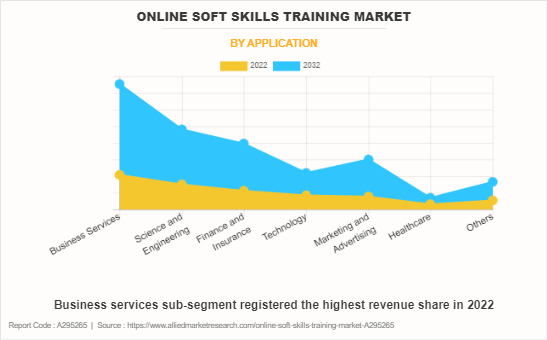Online Soft Skills Training Market Overview
The global online soft skills training market size was valued at USD 7.2 billion in 2022, and is projected to reach USD 24 billion by 2032, growing at a CAGR of 12.8% from 2023 to 2032.
Online soft skills training is the process of obtaining and improving interpersonal skills, communication skills, and other non-technical skills via virtual platforms. Soft skills are crucial in deciding success in a fast-changing professional world where the demand for well-rounded individuals is stronger than ever. This type of training uses digital technology to offer interesting and interactive learning experiences to individuals from many sectors and geographical areas. Accessibility is an important feature of online soft skills training. Individuals may access training modules at their own pace via various online platforms, breaking down geographical barriers and enabling flexibility for learners with varying schedules.

The worldwide move towards remote and hybrid work arrangements has led to an increase in demand for online soft skills training. With workers residing throughout the world, effective communication and cooperation is more important than ever. Online platforms provide users a quick and accessible way to improve their soft skills without the limits of physical location. Virtual collaboration tools, webinars, and interactive modules enable professionals to hone their interpersonal skills and adapt to the details of distant work, resulting in greater productivity and efficiency. The requirement for ongoing learning in the face of technological advancements is another driving factor behind the expansion of online soft skills training. Soft skills are becoming increasingly valuable as automation and artificial intelligence transforms various sectors.
Online training programs provide a flexible and scalable method to upskilling, allowing workers to stay updated with business trends while also adapting their soft skills to changing workplace dynamics. Professionals can easily integrate soft skills development into their hectic schedules since they can study at their own speed and on-demand. The ability to track and assess progress is a significant advantage of online soft skills training, which is enabling it to be included in organizational learning and development programs. These factors are anticipated to boost the online soft skills training market share in the coming years.
The possibility of technological faults and connection concerns is a key challenge for the users. Users may face issues such as slow Internet connectivity, software malfunctions, or hardware limitations, which may hinder the training session's flow. These interruptions not only delay the learning process, but they can also lead to participant irritation and disengagement, lowering the overall efficacy of the training program. Individuals may struggle to remain active and attentive during training sessions due to a lack of physical presence and the distractions of the online world. Maintaining motivation is essential for successful soft skill development and application, and online platforms must adopt new techniques to keep participants engaged and committed.
Moreover, some individuals and businesses may be uncertain about the reliability of online soft skills training programs. Traditional training techniques, such as in-person workshops or seminars, are frequently considered as more reliable and trustworthy. To overcome this challenge and establish the legitimacy of online training platforms, continuous high-quality content, skilled instructors, and measurable results in terms of skill growth and application are necessary.
Online platforms serve to a wide and diversified audience at the same time, allowing organizations to teach whole teams or even entire corporations at the same time. This scalability is especially beneficial for companies seeking to develop a standard set of soft skills across their workforce, encouraging a united and coherent organizational culture. Personalization is an inherent strength of online soft skills training, since it provides learners with experiences that are tailored to their unique requirements and learning methods. Individual progress, strengths, and areas for growth may be assessed using adaptive learning systems, which offer personalized material and assessments.
This personalized approach not only improves training efficacy but also generates a sense of involvement and ownership among learners, resulting in more meaningful skill development. The incorporation of multimedia components in online soft skills training enhances the learning experience by adding depth and richness. Video lectures, interactive simulations, and multimedia case studies engage learners on several levels while catering to a variety of learning styles.
Segment Overview
The online soft skills training industry report is segmented on the basis of type, company size, learner, application, and region. By type, the market is bifurcated into communication, teamwork, time management, problem-solving, creativity, leadership, and others. By company size, the market is classified into small companies, mid-sized companies, and large companies. By learner, the market is classified into male and female. By application, the market is classified into business services, science & engineering, finance & insurance, technology, marketing & advertising, healthcare, and others. By region, the market is analyzed across North America, Europe, Asia-Pacific, and LAMEA.

By type, the communication sub-segment dominated the global online soft skills training market share in 2022. The capacity to cooperate effortlessly within a team is essential for efficient communication. Online soft skills training enhances abilities like active listening, clear articulation, and constructive criticism, which leads to better cooperation. Teams that communicate well may more efficiently share ideas, manage issues, and work towards common goals.
Effective leadership requires strong communication skills. Future leaders are trained via online soft skills training programs that improve their capacity to speak persuasively, engage colleagues, and deliver clear guidance. Effective leaders recognize the value of communication in building trust, enabling creativity, and guiding organizations to success. Communication that is clear and efficient decreases the probability of misunderstandings and errors, increasing overall productivity. Online soft skills training provides individuals with the capabilities they need to successfully communicate information, assign responsibilities, and manage time. As a result, teams may optimize procedures and complete jobs more quickly.

By company size, the large companies sub-segment dominated the global online soft skills training market share in 2022. Employees that have good soft skills are better able to collaborate, communicate, and settle issues. This leads to better collaboration, fewer misunderstandings, and more overall productivity. Large corporations who engage in online soft skills training see a favorable impact on their bottom line as teams work more cohesively and projects are completed more efficiently. Soft skills training that allows for personal and professional growth adds to increased levels of employee satisfaction.
Employees who feel encouraged in their growth are more likely to remain with the organization, lowering turnover costs and preserving institutional knowledge. This dedication toward employee well-being strengthens the company's employer brand, making it an appealing place to work for top talent. Online soft skills training is a more cost-effective option than traditional training techniques. Large corporations can reach a large number of people without the logistical issues that come with in-person training.

By learner, the male sub-segment dominated the global online soft skills training share in 2022. Online soft skills training gives men the tools they need to express themselves effectively, listen attentively, and convey their perspectives with empathy. Building good professional connections, resolving issues, and communicating leadership presence all need effective communication. Men who participate in online soft skills training are exposed to a variety of opinions and cultural subtleties, which promotes cultural competency. This talent is becoming increasingly important in today's globalized workforce, as collaboration frequently crosses countries and cultures.
Soft skills training emphasizes emotional intelligence, assisting men in understanding and managing their own emotions as well as navigating the emotions of others. This increased emotional intelligence improves cooperation, dispute resolution, and general workplace harmony. Adaptability is a significant differentiator in a continually changing corporate environment. Soft skills training builds resilience in males by teaching them how to handle change, accept innovation, and remain calm in the face of uncertainty, eventually promoting an attitude of continual development.

By application, the business services sub-segment dominated the global online soft skills training market share in 2022. The changing nature of the workplace is one of the key reasons for the growth in online soft skills training for organizations. Rapid technical breakthroughs, globalization, and a move towards remote labor characterizes today's corporate environment. Therefore, employees need to manage a variety of different and dynamic issues, needing a strong set of soft skills.
Online training systems help organizations to easily meet these shifting demands, giving employees with the skills they need to adapt and succeed in a continuously changing market. Online soft skills training's scalability is especially beneficial for firms with big or geographically dispersed staff. These training programs may be readily adjusted to suit various numbers of learners without sacrificing content delivery quality.

By region, Asia-Pacific dominated the global online soft skills training market in 2022. Online soft skills training provides learners with exceptional flexibility, allowing them to access courses at their own speed and relaxation. This is especially useful in the APAC region, where professionals frequently encounter difficult work schedules and time zones. Individuals can manage their professional growth with their employment responsibilities owing to the availability of online training. Traditional training techniques can be costly in terms of physical infrastructure, travel costs, and printed materials. Many of these expenditures are eliminated by online soft skills training, making it a cost-effective alternative for organizations of all sizes.
Due to the scalability of online platforms, firms may teach a large number of people at the same time without incurring significant costs. Adaptive learning technologies are frequently used in online soft skills training platforms to modify courses depending on individual requirements and skill gaps. This personalized method guarantees that learners receive relevant material, increasing the training's efficacy. Personalized learning routes assist address particular issues faced by professionals in different circumstances in a varied region like Asia-Pacific, where differences in culture vary.
Key Market Players
The key players profiled in online soft skills training market report include Udemy, Coursera, LinkedIn Corporation, edX LLC, Skillsoft, Pluralsight LLC, HubSpot, Inc., Toastmasters International, Franklin Covey Co., and Harvard Extension School. Collaborations and partnerships are common strategies followed by major market players. For instance, on September 12, 2023, the Rajasthan Government conducted online training under the Mukhya Mantri Yuva Sambal Yojana (MMYSY) to provide skill development and employment opportunities for youngsters.
Impact of COVID-19 on the Global Market
The pandemic's impact on online soft skills training is significant in terms of increase in access to professional development opportunities. Physical barriers were removed, allowing individuals worldwide to attend high-quality training programs from the comfort of their own homes.
This liberalization not only broadened the scope of soft skills training but also encouraged inclusivity by allowing people from all backgrounds to participate in formerly geographically restricted skill-building activities.
Furthermore, the pandemic influenced people's ideas of soft skills. Soft skills, long thought to be secondary to technical competence, have emerged as critical differentiators in the remote work environment.
Key Benefits for Stakeholders
The report provides an exclusive and comprehensive analysis of the global online soft skills training market trends along with the online soft skills training market forecast.
The report elucidates the online soft skills training market opportunity along with key drivers, and restraints of the market. It is a compilation of detailed information, inputs from industry participants and industry experts across the value chain, and quantitative and qualitative assessment by industry analysts.
Porter five forces analysis helps analyze the potential of the buyers & suppliers and the competitive scenario of the market for strategy building.
The report entailing the online soft skills training market analysis maps the qualitative sway of various industry factors on market segments as well as geographies.
The data in this report aims on market dynamics, trends, and developments affecting the online soft skills training market growth.
Online Soft Skills Training Market Report Highlights
| Aspects | Details |
| Market Size By 2032 | USD 24 billion |
| Growth Rate | CAGR of 12.8% |
| Forecast period | 2022 - 2032 |
| Report Pages | 320 |
| By Company Size |
|
| By Learner |
|
| By Type |
|
| By Application |
|
| By Region |
|
| Key Market Players | udemy academy, Harvard Extension School, HubSpot, Inc., Franklin Covey Co., LinkedIn Corporation, toastmasters international, Pluralsight LLC, Skillsoft, edX LLC., Coursera |
The global online soft skills training market size was valued at USD 7.2 billion in 2022, and is projected to reach USD 24 billion by 2032
The online soft skills training market is projected to grow at a compound annual growth rate of 12.8% from 2023-2032 Reach USD 24 billion by 2032
Udemy, Coursera, LinkedIn Corporation, edX LLC, Skillsoft, Pluralsight LLC, HubSpot, Inc., Toastmasters International, Franklin Covey Co., Harvard Extension School., are the major players in the online soft skill training market.
Asia-Pacific will provide more business opportunities for the global online soft skill training market in the future.
The online soft skill training market size is expected to grow due to an increase in demand for entrepreneurial opportunities globally. In addition, the market is driven by increase in corporate training programs.
Loading Table Of Content...
Loading Research Methodology...



